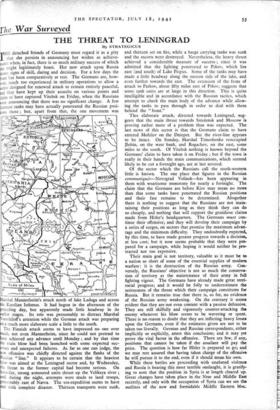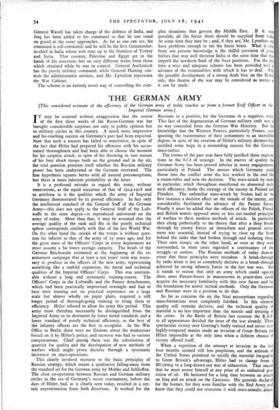The War Surveyed
THE THREAT TO LENINGRAD
By STRATEG ICUS
HE detached friends of Germany must regard it as a pity that she persists in announcing her wishes as achieve- eats when, in fact, there is so much military success of which e might legitimately boast. Her new attack upon Russia ows signs of skill, daring and decision. For a few days the ont has been comparatively at rest. The Germans are, how- ver, much too experienced in military operations to allow a ctor designed for renewed attack to remain entirely peaceful, nd they have kept up their assaults on various points and 1' iairn to have captured Vitebsk on Friday, when the Russians .ere announcing that there was no significant change. A few erman tanks may have actually penetrated the Russian posi- ons there ; but, apart from that, the one movement was larshal Mannerheim's attack north of lake Ladoga and across e Karelian Isthmus. It had begun in the afternoon of the receding day, but apparently made little headway in its arlizT stages. Its role was presumably to distract Marshal 'oroshiloff's attention while the German attack was preparing n a much more elaborate scale a little to the south.
The Finnish attack seems to have impressed no one over uch, not even Mannerheim, since he could not pretend to ave achieved any advance until Monday ; and by that time e main blow had been launched with some expected suc- esses and unexpected failures. As far as one can judge, the ew offensive was chiefly directed against the flanks of the ussian " line." It appears to be certain that the heaviest low was aimed at the Leningrad sector and, by Wednesday, e threat to the former capital had become serious. On Saturday, strong armoured units thrust up the Velikaya river ; and, during the night, attempts were made to land troops, presumably east of Narva. The sea-expedition seems to have met with complete disaster. Thirteen transports were sunk, and thirteen set on fire, while a barge carrying tanks was sunk and the escorts were destroyed. Nevertheless, the heavy thrust achieved a considerable measure of success ; since it was admitted that the fighting penetrated to Pskov, which lies east (and south) of Lake Peipus. Some of the tanks may have made a little headway along the eastern side of the lake, and even farther towards the east. The extension of the front of attack to Parkov, about fifty miles east of Pskov, suggests that some tank units are at large in this direction. This is quite intelligible and in accordance with the Russian tactics, which attempt to check the main body of the advance while allow- ing the tanks to pass through in order to deal with them behind the " front."
This elaborate attack, directed towards Leningrad, sug- gests that the main thrust towards Smolensk and Moscow is proving rather more of a problem than was expected. The last news of this sector is that the Germans claim to have entered Mohilev on the Dnieper. But the river-line appears to be intact. On Sunday, Marshal Timoshenko reoccupied Jlobin, on the west bank, and Rogachev, on the east, some miles to the south. Of Vitebsk nothing is known beyond the Germans' claim to have taken it on Friday ; but if the town is really in their hands the main communications, which seemed likely to be cut a fortnight ago, are at last severed.
Of the sector which the Russians call the south-western little is known. The one place that figures in the Russian communiques—Novograd Volinsk—has been appearing in them with wearisome monotony for nearly a fortnight. The claim that the Germans are before Kiev may mean no more than that some tanks have penetrated the Russian positions and their fate remains to be determined. Altogether there is nothing to suggest that the Russians are not main- taining their positions as long as they think they can do so cheaply, and nothing that will support the graridiose claims made from Hitler's headquarters. The Germans must con- tinue their offensive; and they will develop their campaign by a series of surges, on sectors that promise the maximum advan- tage and the minimum difficulty. They undoubtedly expected, by this time, to have made greater progress towards a decision, at less cost; but it now seems probable that they were pre- pared for a campaign, while hoping it would neither be pro- tracted nor too expensive.
Their main goal is not territory, valuable as it must be to a nation so short of some of the essential supplies of modern warfare: it is the destruction of the Russian army. Con- versely, the Russians' objective is not so much the conserva- tion of territory as the maintenance of their army in full fighting vigour. The Germans have already made great terri- torial progress; and it would be folly to underestimate the seriousness of the threat which their campaign constitutes for Russia. But it remains true that there is, so far, no evidence of the Russian army weakening. On the contrary it seems evident that they are not even content with a passive defensive. They are still skilfully and vigorously counter-attacking the enemy whenever his blow seems to be wavering or spent. There is no reason to doubt that they are inflicting heavy losses upon the Germans, even if the estimates given are not to be taken too literally. German and Russian correspondents, either implicitly or explicitly, attest this conclusion; and it may yet prove the vital factor in the offensive. There are few, if any, positions that cannot be taken if the assailant will pay the price. The question is how far Hitler is prepared to go; and we may rest assured that having taken charge of the offensive he will pursue it to the end, even if it should mean his own.
While these battles are proceeding with unabated violence and Russia is bearing this most terrible onslaught, it is gratify- ing to note that the position in Syria is at length cleared up. Great changes have taken place in the Near and Middle East recently, and only with the occupation of Syria can we see the outlines of the new and formidable Middle Eastern bloc. General Wavell has taken charge of the defence of India, and Iraq has been added to his command so that he can stand on guard at the outer approaches. As far as one can see, his command is self-contained, and he will be the first Commander- in-chief in India whose writ runs up to the frontiers of Turkey and Syria. That country, Palestine and Egypt are in the hands of his successor, but on very different terms from those which obtained while he was in control. General Auchinleck has the purely military command, while General Haining con- trols the administrative services, and Mr. Lyttelton represents the War Cabinet.
The scheme is an entirely novel way of controlling the corn- ple.x situations that govern the Middle East. If it w possible, all the forces there should be supplied from In At some time they may be ; and, if they are, Mr. Lyttelton have problems enough to tax the finest brain. What is cleat from our present knowledge is the skilful prevision of posst. bilities that may well threaten India at the same time that they imperil the northern flank of the Suez positions. For the first time a wise and adequate scheme has been provided well in advance of the eventualities with which it has to deal. With the possible development of a strong Arab bloc on the British side, this theatre of the war may be considered as secure at it can be made.


























 Previous page
Previous page